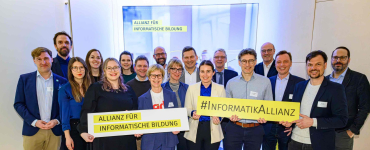At the Internet Policy Forum on 26 April, we will discuss how we can further strengthen trust in digital technologies and applications for the economy, society and public administration. In addition to the German Federal Ministry of the Interior (BMI) State Secretary Dr. Markus-Richter and Dr. Katrin Suder, Chair of the German federal government’s Digital Council, Marcus Busch, Managing Director of Leaseweb Deutschland GmbH, will also participate in the focus talk on digital security and digital sovereignty. In an advance interview, Busch talks about why Germany and Europe are on the right path towards digital sovereignty and strong cybersecurity and where the German federal government still needs to make adjustments. You can register here for the hybrid event in Berlin, which is supported by Leaseweb, Huawei and the Vodafone Institute.
The traffic light coalition has now been in office for more than 100 days. In which areas has the German federal government already set the right impetus and where do you currently see the largest digital policy fields?
Many good individual measures have already been implemented – more activity is becoming visible. Approval times have been shortened, investment support programmes introduced. Overall, however, the announced departure has unfortunately not yet happened; no overarching strategy is discernible.
Digital sovereignty and strong cybersecurity are more important than ever in these times. In your opinion, are Germany and Europe on the right track?
Definitely yes! The German federal government and the European Commission promote important initiatives that benefit businesses. The Digital Markets Act (DMA) and the Digital Services Act (DSA), for example, better protect the data of European companies and users – but are no substitute for data being natively protected according to European regulations. Digital sovereignty in particular is also becoming more and more important in our communication with customers and prospects, and I take that as a good sign!
High electricity prices have been a bitter competitive disadvantage for the industry in comparison to other European countries in recent years. Due to the war in Ukraine, prices are now rising even more sharply, endangering the growth of Germany as a digital location. How should the German federal government counteract this now?
We all have a responsibility to operate data centres and cloud offerings in a climate neutral way. Overall, however, CO2 emissions associated with electricity generation in Germany are rising instead of falling. At the same time, electricity prices have risen to a historic high. We urgently need a concept that makes Germany more attractive as a business location, whether in the short term through state subsidies or also through an energy policy that avoids one-sided dependencies in the future. For example, we have launched various initiatives to make our operations more climate neutral. The German federal government could create incentives here to encourage as many market participants as possible to do the same. Incentives that incentivise high cloud usage, green coding or energy-efficient use of compute resources come to mind, for example.




